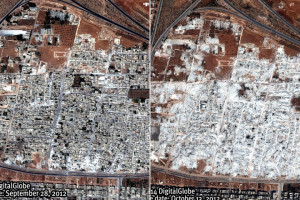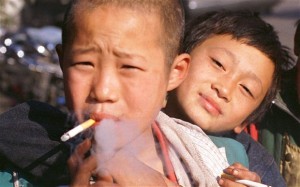News from Syria, China and Russia
Tuesday's World Events — Posted on February 4, 2014
SYRIA – Assad flattens pro-rebel districts

The devastation is seen in this before (left) and after (right) pictures of the devastated neighborhood.
BEIRUT | The Syrian government used controlled explosives and bulldozers to raze thousands of residential buildings, in some cases entire neighborhoods, in a campaign that appeared designed to punish civilians sympathetic to the opposition, a human-rights group said Thursday.
The demolitions took place between July 2012 and July 2013 in seven pro-opposition districts in and around the capital, Damascus, and the central city of Hama, according to a 38-page report by Human Rights Watch [HRW].
The New York-based group said the deliberate destruction violated international law.
“Wiping entire neighborhoods off the map is not a legitimate tactic of war,” said Ole Solvang, emergencies researcher for HRW. “These unlawful demolitions are the latest additions to a long list of crimes committed by the Syrian government.”
HRW said thousands of families have lost their homes because of the destruction.
It said officials in President Bashar al-Assad’s government and state media have described the demolitions as part of urban planning or an effort to remove illegally constructed buildings. But HRW said it found military forces supervised the demolitions, which each targeted areas recently hit by fighting and known to be pro-opposition.
The report includes satellite images of the neighborhoods before and after the demolitions.
Residents told HRW the government bulldozers directed by the military moved in after the rebels retreated from the area.
HRW said it based its report on 14 satellite images, interviews with 16 witnesses and owners of razed homes. It also reviewed media reports, government statements and videos posted online.
CHINA – Government bans cigarettes from schools
China has banned smoking in schools, state media reported last week, the latest step in a government drive to kick the country’s pervasive tobacco habit.

Despite years of campaigning by health activists, China is the world’s largest consumer of cigarettes and smokers can be spotted everywhere, even in schools and hospitals Photo: Getty Images
Despite years of campaigning by health activists, China is the world’s largest consumer of cigarettes and smokers can be spotted everywhere, even in schools and hospitals.
But with a huge public health burden looming ever larger, China has recently intensified efforts to stamp out smoking.
The State Council, or cabinet, is aiming for a nationwide ban on smoking in public places this year, and several cities have already introduced anti-smoking regulations.
But critics say authorities only enforce bans sporadically, if at all, and it is common to see people puffing away in front of no smoking signs.
The latest ban, imposed by the Ministry of Education, covers kindergartens, elementary and middle schools, and vocational schools. Universities must set up smoking areas and forbid lighting up in academic buildings.
Anti-tobacco efforts have been hampered by the country’s powerful tobacco monopoly, health campaigners say, which pays hundreds of billions of yuan in taxes every year.
Schools can no longer seek sponsorship from cigarette brands or post tobacco advertisements on campus, the ministry said in a notice. School principals must enforce the ban by installing smoke alarms or surveillance cameras to spot offenders. School stores must also stop selling tobacco. Schools that do not crack down properly will be punished, the ministry said.
As part of the battle against smoking, the government had earlier urged Communist Party cadres and government officials to stop smoking in schools, workplaces, stadiums, and on public transport and elsewhere to set a good example.
RUSSIA – Thousands of anti-Putin protesters march in Moscow
MOSCOW | Several thousand protesters marched through central Moscow on Sunday to call for the release of 20 people who were arrested after clashes between police and demonstrators in May 2012.
 Some of those jailed face up to 10 years in prison if convicted for the protest, held on Bolotnaya Square on the eve of President Vladimir Putin’s inauguration to a third term as Russia’s president.
Some of those jailed face up to 10 years in prison if convicted for the protest, held on Bolotnaya Square on the eve of President Vladimir Putin’s inauguration to a third term as Russia’s president.
Putin’s return to the presidency saw the passing of new laws aimed at cracking down on anti-government protests and restricting non-governmental organizations.
The protesters marched Sunday with portraits of the jailed protesters and a banner stretching across the street reading: “Freedom to the Bolotnaya heroes, the hostages of Putin.”
Some also carried Ukrainian flags to show their support for the anti-government protesters in neighboring Ukraine, where demonstrations have been going on for more than two months.
Of the 28 people rounded up in the Bolotnaya case, eight were recently freed on amnesty. Several defendants have been under house arrest, but most of the others have been in jail for more than a year and a half.
Only three of the cases have been decided: Two defendants received light sentences after cooperating with investigators and a third was sent for forced psychiatric treatment. That man, Mikhail Kosenko, who was convicted of beating a policeman, had a history of schizophrenia, but rights activists charged the court was reviving the Soviet-era practice of [forced psychiatric treatment] against dissidents [who didn’t need it].
(The news briefs above are from wire reports and staff reports posted at NY Post on Jan. 31, London’s Daily Telegraph on Jan. 29 and YahooNews on Feb. 2.)
Background
SYRIA
- The areas targeted were Masha al-Arbayeen and Wadi al-Jouz in Hama, Qaboun, Tadamoun, Barzeh and the Mezzeh military airport in Damascus, and Harran al-Awamid outside the capital.
- Buildings in Masha al-Arbaeen are visible in a photo dated Sept. 28, 2012. In a second, from Oct. 13, 2012, the buildings have been pulverized, while adjacent neighborhoods remain untouched.
- Wadi al-Jouz met a similar fate.
- HRW cited one woman who lived nearby and said the army came to her district afterward and announced “they would destroy our neighborhood like they destroyed Wadi al-Jouz and Masha al-Arbaeen should a single bullet be fired from here.”
- “No one should be fooled by the government’s claim that it is undertaking urban planning in the middle of a bloody conflict,” HRW's Ole Solvang said. “This was collective punishment of communities suspected of supporting the rebellion. The UN Security Council should . . . send a clear message that cover-ups and government impunity won’t stand in the way of justice for victims.” (from the NY Post article above)
RUSSIA
- From an October 2013 report: The Bolotnaya 12 are a dozen once-ordinary Russians who were arrested at a demonstration on the eve of Vladimir Putin’s inauguration as president in May 2012. Most of them are charged with rioting and assaulting police on Bolotnaya Square, not far from the Kremlin. Nearly all are in jail, denied bail despite a lack of previous criminal records.
- That protest was just one in a string of large demonstrations against dishonest elections and government corruption that had begun five months earlier. All the previous protests had proceeded peacefully. Detentions, when they happened, had lasted for only days.
- But the May 6 march to Bolotnaya was a direct challenge to Putin as he was about to reclaim his Kremlin office, and this time the response was severe. About two dozen protesters in all were charged, but the Bolotnaya 12 are the first large group to go on trial.
- The defendants’ supporters describe the proceedings as theater of the absurd, contending that the 12 were plucked out of obscurity to serve as examples of the peril of opposing the Putin government. The Pussy Riot case of last year, in which members of a punk-rock group were sentenced to two years for staging a protest in a Moscow cathedral, sent a similar message, but the Bolotnaya 12 defendants are remarkable for their anonymity and the seeming randomness of their arrests.
- Since they were charged, Moscow’s protest movement has withered. In October, perhaps 10,000 people turned out to call for the freeing of political prisoners, the Bolotnaya 12 prominent among them. Earlier protests had drawn several times that.
- Just as the arrests marked a turning point, ushering in a period of repressive laws and revealing a more vindictive Kremlin, so are the verdicts expected to provide a signal of what lies ahead. Will the authorities decide they have made their point, impose suspended sentences and send a conciliatory message? Or will the defendants receive the full sentences - up to 13 years? (from a washingtonpost article)
